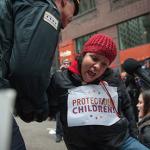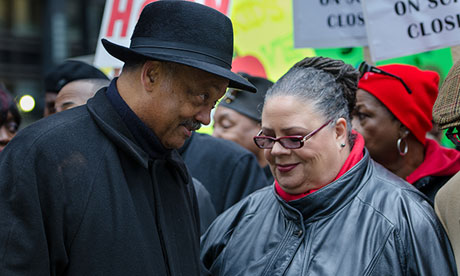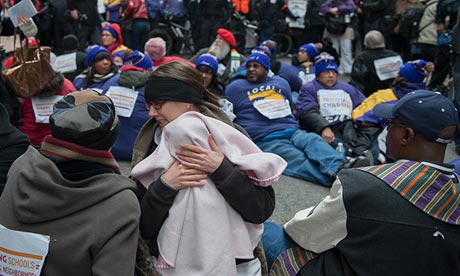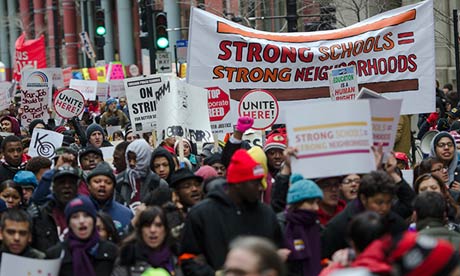Defending Public Education - Mass Arrests in Chicago Protests
https://portside.org/2013-03-28/defending-public-education-mass-arrests-chicago-protests

Portside Date:
Author: Gary Younge, Robert C. Koehler
Date of source:

- Arrests at Chicago Schools Protest - Garry Younge (The Guardian)
- Mass School Closings Offer Brutal Example of Chicago's Disconnected Politics - Robert C. Koehler for Buzzflash at Truthout
Arrests at Chicago Schools Protest
More than 100 people arrested while taking part in mass civil disobedience against Rahm Emanuel's cuts and closures
by Gary Younge
March 27, 2013
More than 100 demonstrators taking part in mass civil disobedience were arrested in Chicago http://www.guardian.co.uk/world/chicago on Wednesday as several thousand people marched against the largest proposed round of school closings in recent memory. http://www.nytimes.com/2013/03/22/education/chicago-says-it-will-close-…
Many carried placards proclaiming "Strong Schools, Strong Neighbourhoods" and "Protect Our Children" while chanting "Whose Schools, Our Schools" and calling for mayor Rahm Emanuel's http://www.guardian.co.uk/world/rahm-emanuel resignation.
"We're signalling that there is going to be a large and determined movement that will use the tactics of civil disobedience and direct action in order to keep these schools open," said Chicago Teachers Union vice-president Jesse Sharkey, who was arrested outside City Hall, one of 131 detained by police. "We see this event as kicking off an extended campaign this spring and we think it was a great success."
The city last week announced plans to close 54 schools affecting more than 30,000 students, primarily in low-income black and Latino areas. The proposals - which had already sparked huge, rowdy protests at hearings throughout the city prior to the announcement - mark Emanuel's second major confrontation over education in less than six months following the teachers' strike in late August.

The Rev Jesse Jackson and Karen Lewis, president of CTU Local 1, at the Chicago school closures protest.
Photograph: James Fassinger for the Guardian
Chicago Public Schools claims the closings are necessary to plug a $1bn deficit in the third-largest school district in the city and that consolidating under-utilised and under-performing schools will save $560m over 10 years by reducing investment in shuttered buildings. The district insists the savings will go to improving classroom resources including air conditioning, libraries and iPads for all students in grades 3-8.
Roughly 100 schools in Chicago - the third-largest school district in the country and with 87% of students from low-income families http://www.cps.edu/about_cps/at-a-glance/pages/stats_and_facts.aspx - have already been closed since 2001. Eighty eight per cent of the students affected in those closings were black, even though black students comprise just over 40% http://www.npr.org/2013/03/23/175104850/race-poverty-central-to-nationa… of the city's student body as a whole.

The Rev Bonnie Osei-Fimpang and her five-month-old daughter Carmen sit in the street in front of Chicago City Hall.
Photograph: James Fassinger for the Guardian
Community groups, unions and many parents argue that the closings will devastate already struggling areas, http://schoolcuts.org/ raise student-teacher ratios, put children in danger by forcing them to cross gang lines to go to new schools and are based on flawed calculations and savings.
"For too long children in certain parts of Chicago have been cheated out of the resources they need to succeed because they are in underutilised, under-resourced schools," said Barbara Byrd-Bennett, the CPS chief executive, explaining the announcement. "The district must consolidate ... to get students into higher-performing schools."
Opponents point out that there is little evidence that school closings achieve that aim and claim the closings mark an acceleration of the city's bid to "privatise" education by forcing students into charter schools.
"In the same time these school closings have been taking place over the past decade, the city has opened about 100 charter schools in the very neighbourhoods where they're now closing schools through under-utilisation," said Sharkey. "Meanwhile supports of charter schools have been very open ideologically about making school competition part of the larger picture.
"We have not yet won the argument with the people of Chicago that this is a critical moment to be active. But this was a good start. Four or five thousand people and lots of different schools represented today. The argument can and will be won."
A study by the University of Chicago's Consortium on Chicago School Research revealed that from the 38 schools closed between 2001 and 2006 only 6% of students who were moved went to high-performing schools. http://ccsr.uchicago.edu/publications/when-schools-close-effects-displa…
"Our research found that school districts tended to save under $1m per school ," Emily Dowdall, a senior associate at the Pew Charitable Trusts told the New York Times. "So in some ways that's not a game-changing amount."
Sharkey further argues that the city rarely follows through on its promises on savings. "In the past there's been investment for the first one or two years. But the money dries up once the attention is gone."

Thousands of parents, students, teachers, public school employees and community residents rally against proposed public school closings in Chicago.
Photograph: James Fassinger for the Guardian
Emanuel, who was absent on a skiing vacation on the day the closings were announced, which many here interpret as a bid to disassociate himself from the move, has since joined the fray. "If we don't make these changes we haven't lived up to our responsibility as adults to the children of the city of Chicago," he said. "And I did not run for office to shirk my responsibility."
The CTU emerged with considerable public support after it blunted Emanuel's attempts to tie teachers' pay to test scores last year. It has pledged to continue the campaign of non-violent disobedience. "People who work in the schools and rely on public schools will oppose the mass closings by any and all peaceful means," Sharkey has told union members. "[School closings] are not something we are prepared to accept without a fight ... We're going to take this fight as far as we have to, to defend our community schools."
[Gary Younge is a feature writer and columnist for the Guardian based in the US.]
by Robert C. Koehler
March 28, 2013
"The status quo in Chicago is no longer tolerable," Andy Willis said, summoning the violent headlines of the past year and the past week.
This was Palm Sunday, in a church basement in a big-city neighborhood, and the time had come to stand for something enormous. My God, a six-month-old baby, Jonylah Watkins, was shot and killed this month in Chicago, as her father held her on his lap while sitting in a parked van. That was just the latest shocker. Violence is the norm, in this city and so many others. The death of children is the norm.
"We can't live with a status quo like that," Willis said. "We know things are breaking down . . ."
The event was called "A Remedy for Violence" and announcements for it proclaimed: "This will be a joyous and hopeful event as we aim to eliminate all violence in our community in 10 years! Zero in Ten."
No way! They're not serious, or they're incredibly naïve. But I knew they weren't, and as my cynicism gave way - this was about a week before the event was to take place - I felt an enormous sense of empowerment rising. I thought about the words of the Earth Charter, which begins: "We stand at a critical moment in Earth's history, a time when humanity must choose its future."
Yes, now is the time to choose our future, so let us choose one that transcends the insanity and sheer stupidity of violent behavior. This requires personal empowerment. It also requires collective empowerment. And this is what I felt in the audacious declaration: "We aim to eliminate all violence in our community in 10 years."
Lori Crowder, executive director of the Alliance of Local Service Organizations (ALSO) and one of the event's organizers, told me the inspiration for this declaration came from Chicago's Department of Transportation, which recently announced it had begun a project to end traffic-related fatalities in the city 10 years.
This is how ideas ignite. If a group of transportation professionals can take on the root causes of traffic accidents, why, she asked, can't we wrestle with the root causes of violence? What would it look like? And so a Remedy for Violence began, with the disturbing realization that "We are the people we've been waiting for."
And the first event in the process was held, in English and Spanish, at St. Luke's Lutheran Church in the multiracial, trouble-plagued, vibrant and much-beloved neighborhood of Logan Square. This day, Palm Sunday, said Willis, "is about a man who rode into an occupied city with a militarized police force. He rode in on a donkey - a mockery of the great horses of Rome."
And this is how we change the world.
But first we have to look at the world with clear eyes. Our "leaders," elected and otherwise, have their agendas - the mayor of Chicago, Rahm Emanuel, recently announced, for instance, that for reasons of austerity the city will be closing 61 "low performing" public schools - but these agendas seldom have depth or embrace the needs of whole, healthy communities.
Crowder, speaking at the event, pointed out an obvious starting place, unaddressed by the mayor, seldom addressed or even acknowledged by government officials: There are way too many "disconnected youth" in the neighborhood and the city and the country. These are teenagers who are neither in school nor have a job - some 800 of them in Logan Square, she said, and another 1,600 in nearby Humboldt Park.
They've left, or been ejected by, the struggling and underfunded educational system and they can't find work because there is no work. There's a 40 percent dropout rate in Chicago high schools.
"They're on the streets," she said. "They become victims or perpetrators of crime, or both. They show up in prisons, jails, hospitals. These youth - our youth - need us to do better."
Youth, poverty, education, militarism . . . these were the primary focal points in this initial conversation. They're not abstract topics. They're an unavoidable part of life in the neighborhood, in all the forgotten neighborhoods of America. Much of the effort to create change has to involve putting unrelenting pressure on the politicians in our alleged democracy to see and embrace the same problems the people do - not deliver solutions from on high, but sit in the same chaos, joy and despair of community life and work together, starting from scratch in the thought process, looking at things from the bottom up.
Mass school closings are a brutally vivid example of the disconnected politics of Chicago. Schools in high-poverty neighborhoods are always the most poorly funded; and when children, for a complex array of reasons - such as being hungry, homeless or abused - fail to measure up in the fake science of aptitude testing, the schools are judged as failures and threatened with closure. If they are closed, struggling communities lose a crucial social anchor and kids have to walk into dangerous territory to learn to read and write. In the school buildings, the focus becomes more and more on security. Every kid is a suspect. "Learning" becomes grim and absurd. The vicious cycle spirals downward. Kids who want a future join the military.
This is the status quo that is no longer tolerable.
[Robert Koehler is an award-winning, Chicago-based journalist and nationally syndicated writer. His new book, Courage Grows Strong atthe Wound (Xenos Press) is now available. Contact him at koehlercw@gmail.com, visit his website at commonwonders.com or listen to him at Voices of Peace radio.]
